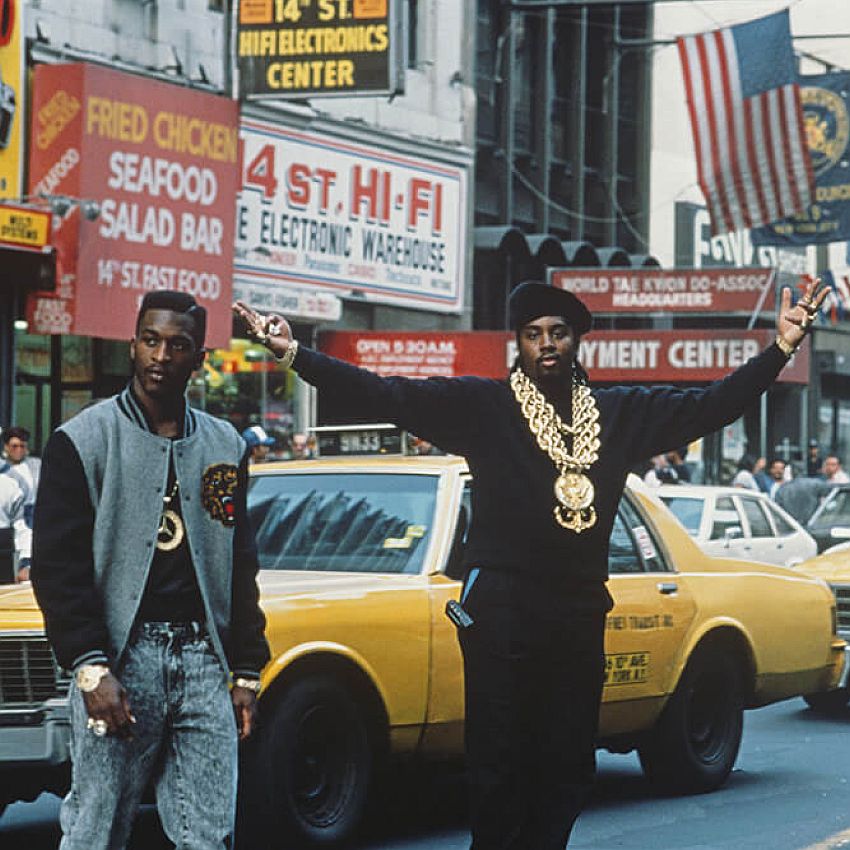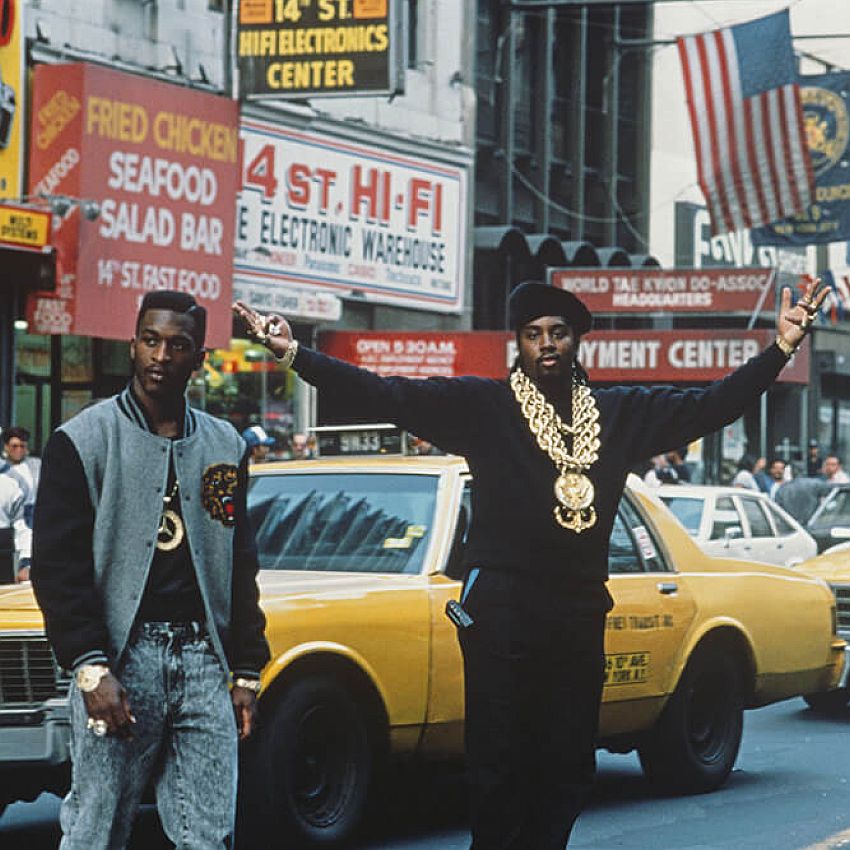
Credit: Michael Ochs
Robert Ham would weigh the same as Andre the Giant with all his gold chains on.
Remixes exist to enhance the longevity of a song. It started with dub producers, disco DJs, and early hip-hop turntablists blasting instrumental portions apart with reverb and echo, manipulating tape edits to extend the breaks and juggling between two copies of the same record—all to keep bodies on the dancefloor. It eventually developed commercial implications: Lil Nas X’s “Old Town Road” was already a smash in 2019, but got shot into the stratosphere thanks to a remix featuring Billy Ray Cyrus. Further versions from Diplo to Young Thug to BTS member RM kept the song atop the worldwide charts for months.
As important as that arm of remix culture is, those extended versions of songs tend to be washed aside in favor of the original track. The remixes that truly stick and survive long past the expiration date of their source material take the music—or the artist that created it—to another plane entirely. Often, that’s a matter of giving a dance/club overhaul to an existing pop or rock tune — as British duo DNA did with “Tom’s Diner,” an a cappella piece by boho folk artist Suzanne Vega. It’s what producer Armand Van Helden did with Tori Amos’ harpsichord-driven diss track “Professional Widow” too. In the best cases, the original track is entirely visible but the remixer has infused it with so much of their personality it feels more like a collaboration than an after the fact makeover.
The Coldcut remix of Eric B & Rakim’s “Paid In Full” falls squarely into the latter category. Conceived and created by Matt Black and Jonathan More, the U.K. musicians and producers keep the raw elements intact. The looped breakbeat is pinched from the Soul Searchers’ 1974 track “Ashley’s Roachclip.” The bassline is inspired by “Don’t Look Any Further,” a 1984 bit of synthetic soul from former Temptations member Dennis Edwards. Rakim kicks a serpentine flow and lyrics about empty pockets and empty stomachs. There’s even a sample of the rapper imploring listeners to “pump up the volume,” cut in from “I Know You Got Soul,” another track from Paid In Full.
The remix earned its “Seven Minutes of Madness” subtitle from the effects that Black and More surround the core components with — from the now-legendary drop (“This is a journey into sound…”), taken from a 1958 album meant to show off the wonders of stereo recording, to a spiraling vocal piece from the Salsoul Orchestra’s “Ooh I Love It.” The track is dotted throughout with samples: film dialogue, snippets from rare disco, reggae, and rap singles; a touch of hip-hop mainstay James Brown; original SNL announcer Don Pardo interrupting the program.
The most crucial detail is a vocal hook from then-little known Israeli artist Ofra Haza’s “Im Nin’alu” that pushed the track into far more exalted territory. With that drop alone, Coldcut proved to have ears and production skills equal to that of like-minded contemporaries such as Prince Paul and the Bomb Squad.
That’s at least how Julian Palmer, then A&R executive for Island Records offshoot 4th & B’way, felt when he heard Coldcut’s early self-released singles “Say Kids (What Time Is It?)” and “Beats + Pieces.”
“I was quite obsessed by them,” Palmer remembers. “It was born out of the club scenes in London and New York at that time, but it felt very DIY and it felt a lot like the punk scene. It took a huge amount of creativity to come up with something that original. We felt a lot of excitement around that.”
At the time, Palmer was also trying to facilitate the European release of “Lesson 1, 2 & 3,” the 1985 single by Double Dee & Steinski that applied cut-and-paste sampling and an arch sense of humor to remix G.L.O.B.E. & Whiz Kid’s “Play That Beat.” But as they started the process of trying to clear the samples used on the remix, they stopped short. “I think we got as far as Disney and that was that,” says Palmer.
Instead, he and the label decided to try and create their own version from scratch, using Coldcut, a duo that marked “The Lesson” as a huge influence and would go on to collaborate with Steinski. To help continue the promotional push for Paid In Full, Palmer conscripted More and Black to tackle the record’s title track for a single release.
“For one, the album version was short, so we wanted to elongate that with some studio trickery,” Palmer says. “I wanted to refresh it. And two because the beat became synonymous with a ton of stuff at that time. ‘Pump Up The Volume,’ for example. People were drawn to that loop.”
Without access to the master tapes for Paid In Full, Palmer armed his charges with multiple vinyl copies of the album to work from and set them up with two days in the Island Records studio with engineer Raine Shine to undertake the laborious process of stitching together this seven-minute masterpiece.
“It was pretty much constructed one stage at a time,” Black says, speaking via Zoom from his home in London. “The advantage of today’s non-linear editing is that you don’t have to have a straight line from A to B. We didn’t have the luxury of that. We were used to working with pause tape, which is about as basic as it gets. Then with multi-track, you get the ability to layer that up, but it is still confined to a timeline, which [made it] difficult to then chop and paste into a different sequence.”
The pair came well-prepared for the task at hand. Both were rabid record collectors, seeking out cuts to add to their DJ sets and the mixes they would construct for their respective radio shows on pirate station KISS-FM. And throughout their listening, they would seek out those little moments they could cull for samples. “We’d build up these treasure chests of golden nuggets that we could then use to make a bit of jewelry out of,” says Black.
Coldcut’s “Paid In Full” remix is littered with those tiny baubles. They pulled little bits of spoken word from a 1979 Mikey Dream album (“You make me feel so good!”) and a slinky remake of “Soul Man” by former James Brown bassist “Sweet” Charles Sherrill (“He’s a sweet soul brother”). There’s the “huh!” from the middle of Free Expression’s late disco banger “Chill-Out!” and a bit of affected crying found on an early rap cut by duo Hassan & 7-11.
There was a cheekiness to the mix as well—little bursts of humor like the drop of Humphrey Bogart saying, “Wait a minute…you’d better talk to my mother” that undercut the dead serious tone of Rakim’s rhymes. For that, Coldcut again cop to the influence of “The Lesson” and Steinski.
“I think they deserve a lot of credit for injecting different sources from films and rock and roll and bits of cartoons into the hip-hop genre,” says Black. “That kind of surreal tongue-in-cheek, ‘let’s see what happens when you juxtapose these things that wouldn’t be in the same piece of music.’ We jumped right on that.”
That approach helped Coldcut secure the most essential ingredient in their remix: the sample of Ofra Haza’s “Im Nin’alu.” As the story goes, More heard the track on London’s Capital Radio and was an instant fan, tracking down the record and using it in his DJ sets. As he and Black were putting together the “Paid In Full” mix, he pulled the record out again, pitching it down to -8 on the turntable and finding that it slotted in perfectly with Eric B’s beat.
Heard today, 30-plus years after the release of the remix and countless other hip-hop tracks that have followed in its wake, that pealing hook from Haza still has the power to induce delirium. And it might have helped push the single to the upper reaches of the charts in the U.K. and Europe. More and Black defer some of the success to Palmer’s marketing of the track. Rumor has it that he purposefully didn’t press enough copies of the single in order to hype up demand—to the point that supposedly fistfights broke out at record shops over the 12”. “I don’t know if that actually happened,” says Black, “but it certainly didn’t do the hype any harm.”
The single was doing so well that 4th & B’way hurriedly got Eric B & Rakim on a plane to England for the first time to make an appearance on the legendary chart show Top of the Pops. The only problem there was that the two men weren’t told that their hit single was actually a remix. So when they got sent out to mime along to the playback, according to Palmer, “Rakim stormed off the stage and locked himself in his dressing room. He couldn’t believe that he was being asked to perform to a version of his track that he’d never heard before.”
Rakim eventually came to his senses and did the job. He also came around to loving what Coldcut did, calling it his favorite remix of their work. His partner Eric B was not so kind.
“He notoriously said that it was ‘girly disco music,’” remembers Black, grinning, “which we took as a compliment.”
The success of this remix, not to mention the audiences Coldcut were netting for their collaborative KISS-FM show Solid Steel, helped push the duo as close to pop stardom as they could stomach. They soon began working with the likes of pop-soul singer Lisa Stansfield and dancehall toaster Junior Reid, and scored a Top 20 hit in the U.K. with their debut album What’s That Noise? Black and More also became quickly disillusioned with the machinations of the major label world, inspiring them to found their own imprint Ninja Tune. They’re also continuing to make new music. This past July saw the release of Keleketla!, a collaborative project that finds Coldcut working with artists and producers from South Africa as well as Afrobeat legend Tony Allen and jazz keyboardist Joe Armon-Jones.
As for the long-tail influence of this remix, it’s not hard to find the signposts throughout hip-hop and electronic music. It’s there in the Bollywood sample that anchors Just Blaze’s production for the Erick Sermon single “React.” And it’s there in the production work of DJ Shadow and Dan The Automator who love to build tracks from unexpected source material. Palmer also hears it in the live mashups of artists like Girl Talk and Madeon.
“That was the spirit of everything that we were trying to do back in those days,” Palmer says. “It doesn’t require the same level of crate digging and inventiveness as taking something that nobody else even knew about, but it’s what Coldcut might look like in the modern age.”

